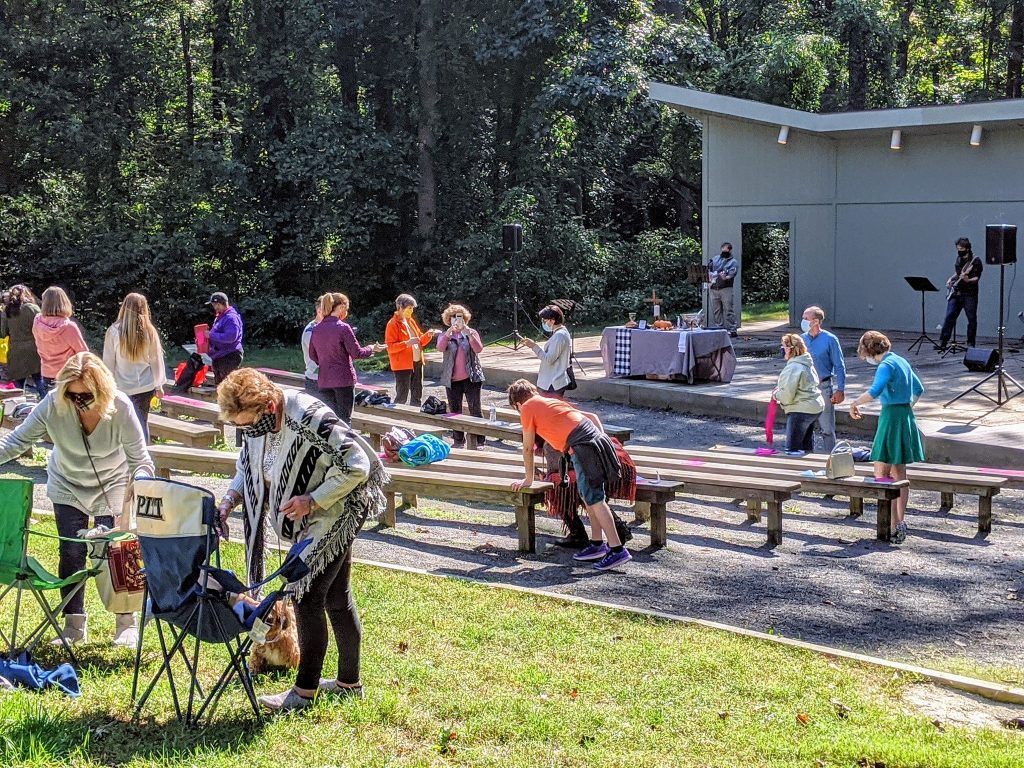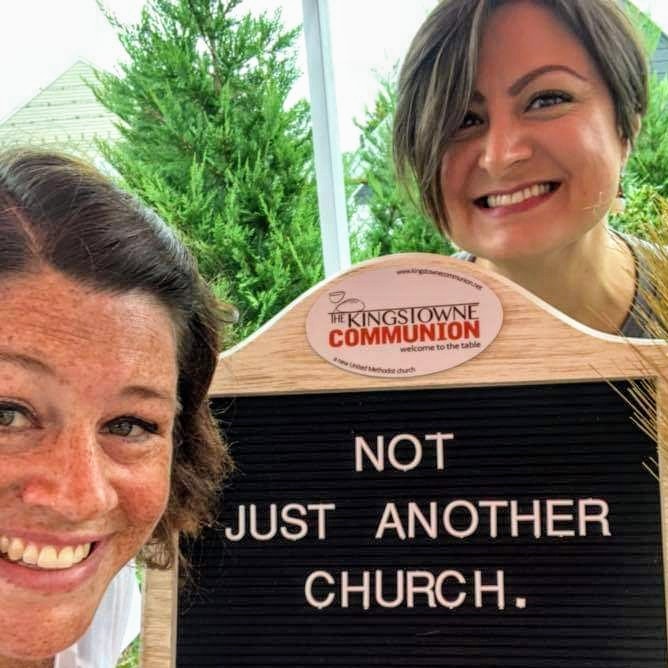By: Madeline Pillow White
View “Bright Spot” video about the new church charge at the link.

The youngest church in the conference is now The Kingstowne Communion in the Alexandria District. In early January 2021, an organizing charge conference was held for the church, which began as a multi-site from Aldersgate UMC.
“We just gained our financial independence from Aldersgate at the end of December, and the way that the United Methodist structure works is you have an establishing charge conference where you officially become your own church,” the Rev. Michelle Matthews, Kingstowne Communion pastor said.
The leadership team from Kingstowne has already crafted a strategic plan for the next 10 years and the ways in which they want to live into their independence.
Matthews has been appointed to the church for six years and began her ministry there at a difficult time for the life of that church.
“My first year at Kingstowne was hard. It was so hard. It was hard because I was following a pastor who was incredibly ill and a culture that had a sense of grief that you didn’t want to move on past because they needed to process this but also it couldn’t define the church. So it was a really, really hard first year,” Matthews said.
What followed was a time of reflection for Kingstowne. Matthews ceased weekly Sunday services due to the declining numbers of members and the remaining members would meet in her basement to reflect on why they stayed and what connected them to the church.
Matthews shared that the sense of table, taking Communion each Sunday, and actually worshipping around table became both an image and a starting point for the church from which to grow. At that point, the church’s relationship with Aldersgate changed. What has started as a traditional multi-site plant developed into what Matthews calls more of a mother-daughter relationship. While influences from Aldersgate were acknowledged and maintained, it couldn’t be denied that the physical distance (25 miles) and the large differences in demographics from jobs to a housing development of townhomes, made the two very different from each other. Members of Kingstowne embraced their new direction and the individuality of their church from the mother church.
Matthews also started growing a leadership team for the church with what she called “some bold asks.”
Working with a coach, it was initially hard for Matthews to figure out who her team would be without seeing them at a weekly Sunday worship. Her coach encouraged her to look differently:
“Where do you see people who have competency for the ministries of the church? Where are the people you have natural chemistry with? The kind of people you want to do to church with and then get lunch with afterwards? Where are those people? Where are the people where you see the beautiful character of God in them even if you don’t know if they name it as Jesus?”
With the help of this team and the church’s own reflective period, a new DNA emerged.
“We created this DNA from the beginning in our leadership team, so that we make it clear that I don’t expect that you will do everything in the life of the church but you should know what’s going on and you should care about it and trust those who are leading it and advocate for it,” Matthews said. “That’s been the greatest gift. I take it all the way back to that leadership team of why Kingstowne is the way it is today.”
In late 2016, the weekly worship was relaunched and a new mission started.
“When we came up with this mission of courageous conversation, creative community collaborating for the common good, we began filtering everything we do through those three things,” Matthews said.
For Matthews, the church’s work in creative community and collaboration really propelled the church forward.
It was a very important personality trait of Kingstowne that the church not own a building. As the church looks to the future, this will be an ongoing part of their DNA. Matthews said this fact actually became their greatest gift as they had to ask other people in the community to help.
This started partnerships throughout their community for the church to hold events and worship services.
At Nalls Produce, the church found a willing partner to hold a yearly “Christmas at the Manger” event. Instead of payment, Nalls asked for the church to provide music for one of their big sales days and to provide a Santa. This event grew into other events such as an Easter Egg Hunt for the community and other services such as Ash Wednesday and Good Friday.
At Fiona’s Pub, Kingstowne found a place to host Pub Theology events.
At a local winery, the church also found another location for midweek services.
The important distinction, Matthews said, is that her church did not do anything really different except take worship into public spaces while the spaces remained open so that the general public could see what the “church” was doing.
“We are taking just regular old services, just Christmas and Easter and Good Friday and Ash Wednesday, but we are taking them into public spaces and we are not adapting them all that much,” Matthews said. “It’s your normal Christmas liturgy…. but it’s something about injecting it into a space that is different that makes people pay attention in a new way. It makes marketing of these events a whole new thing.”

As Kingstowne grows into their new independent status, the goal is to continue growing in and through their community presence and partnerships and then focusing on worship.
“We want to keep the culture of multiplication of the center of who we are,” Matthews said. “We have dreams for what does growth look like when you don’t have a building, when you can’t have extra space to hold people. Growth looks like multiplying in more communities. So taking our method of courageous conversation and creative community and collaborating for the common good and finding where is another space, a neighboring community where this will hit home and dreaming about how to multiply.”
-Madeline Pillow White is the conference director of Communications.
